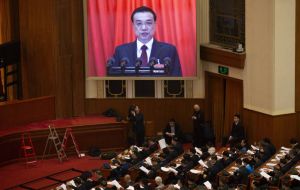MercoPress. South Atlantic News Agency
World markets fall as China cuts its economic growth target
 China cut its growth target for this year to 6.0 to 6.5%, in line with expectations, from around 6.5% last year.
China cut its growth target for this year to 6.0 to 6.5%, in line with expectations, from around 6.5% last year.  Premier Li Keqiang said China sees a budget deficit of 2.8% of GDP and the Finance Ministry set the quota for local government's special bond issues at 2.15 trillion Yuan
Premier Li Keqiang said China sees a budget deficit of 2.8% of GDP and the Finance Ministry set the quota for local government's special bond issues at 2.15 trillion Yuan Asian shares stepped back on Tuesday after China cut its economic growth target and pledged measures to support the economy amid growing challenges from rising debt and a dispute over trade and technology with the United States. Australian shares dropped 0.6% while South Korea's Kospi lost 0.5%. MSCI's broadest index of Asia-Pacific shares outside Japan dipped 0.2% and Japan's Nikkei dropped 0.3%.
China cut its growth target for this year to 6.0 to 6.5%, in line with expectations, from around 6.5% last year.
Premier Li Keqiang also said the country sees a budget deficit of 2.8% of GDP and the Finance Ministry set the quota for local government's special bond issues at 2.15 trillion yuan, 0.8 trillion yuan above last year's quota.
“The increase in local governments' special bond is fairly large,” said Naoto Saito, chief researcher at Daiwa Institute of Research. “Since those funds will be solely used for infrastructure investments, you cannot avoid the impression that the government is relying on investments to support the economy in the short-term rather than de-leveraging. This could cause problems in the longer term.”
Wall Street's major indexes fell on Monday, with the Dow Jones Industrial Average shedding 0.79% and the S&P 500 losing 0.39%.
An unexpected fall in U.S. construction spending, data that normally attracts little attention, was cited as a factor. But others saw the retreat as a long overdue correction after a rally since late last year.
MSCI's World index,, a gauge of 23 developed markets, has risen 16.6% from its near two-year low set on Dec. 26 low, even as the earnings outlook stagnated, driven by hopes of a dovish
Fed and a compromise between Beijing and Washington on trade.
The index is now trading at 14.6 times expected earnings, the highest level since early October, when a bear market began globally.
Thus a media report on Monday that U.S. President Donald Trump and Chinese President Xi Jinping could reach a formal trade deal at a summit around March 27 prompted profit-taking rather than follow-through buying.
The 10-year U.S. Treasuries yield dropped to 2.724 percent after touching from six-week highs of 2.768 percent in the past two sessions.
In currency markets, the dollar held an upper hand against many of its rivals as other major central banks are seen tilting to a more dovish stance than the Federal Reserve.
The euro fetched US$1.1339, having dropped 0.25 percent on Monday, amid expectations the European Central Bank is preparing to give banks more cheap, long-term funding at its policy meeting on Thursday.




Top Comments
Disclaimer & comment rulesCommenting for this story is now closed.
If you have a Facebook account, become a fan and comment on our Facebook Page!